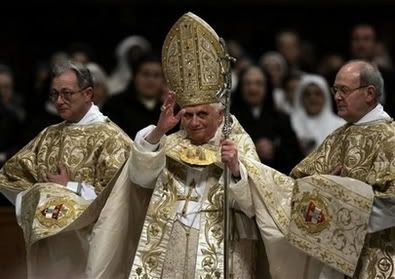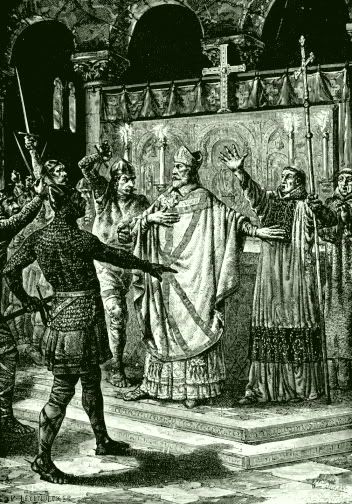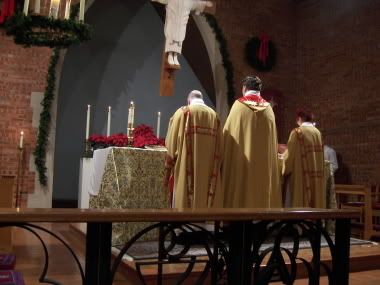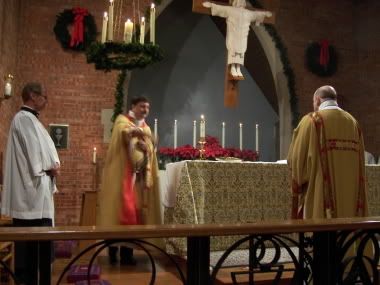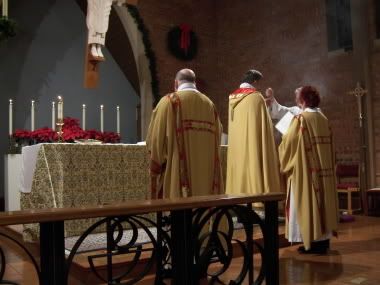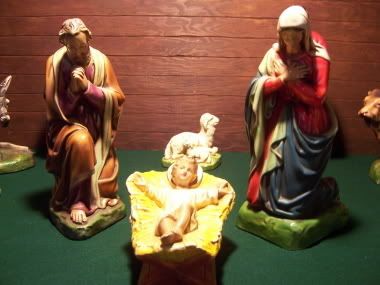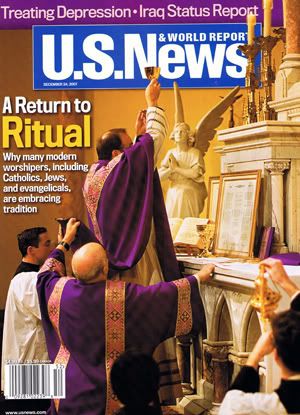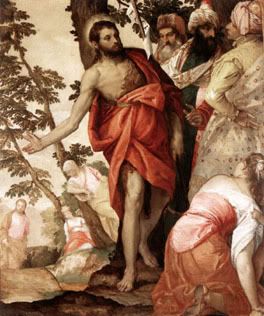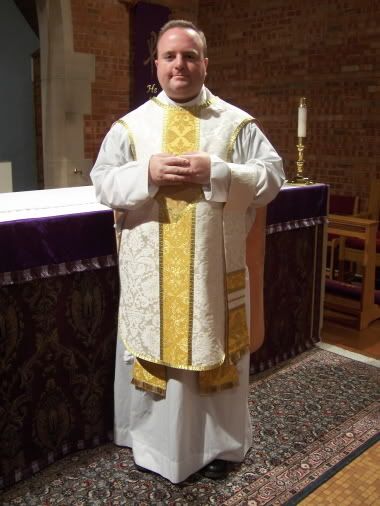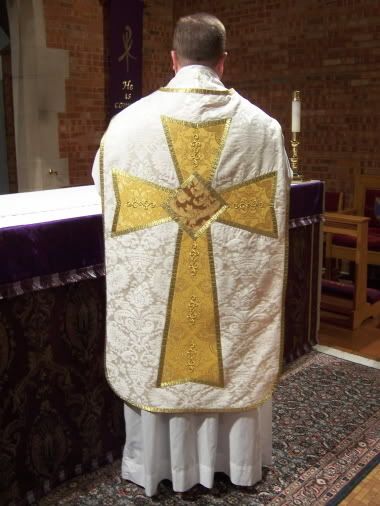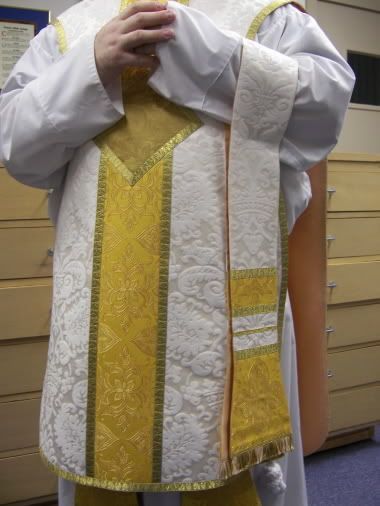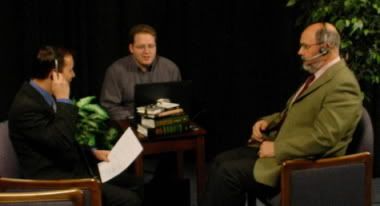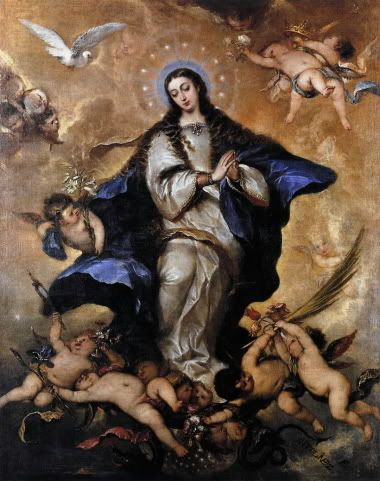 A sermon for the Fourth Sunday of Advent, Year A.
A sermon for the Fourth Sunday of Advent, Year A.A teenage girl turns up pregnant, to the surprise of family and friends. She says a stranger showed up in her room one night, told her not to worry, that things would be okay, and convinced her that the whole thing was “God’s will.” . . . A young man, just getting started in his relationship, is
already wrestling with the question of divorce. “How can a girl I love so much really be cheating on me?” Should he try to save the relationship, or haul her into divorce court? . . . “Couples in conflict” on the next
Dr Phil Show.
On this last Sunday of Advent, our focus moves from the future (the Second Coming of Christ in glory to judge the living and the dead) back into the past (the first Coming of Jesus at his Incarnation). On the other two years of the Sunday lectionary, this is Mary’s Sunday, but in this year, our attention turns more to Joseph.
In our Gospel today, Joseph learns about the pregnancy of Mary, and wrestles with what to think about it and what to do about it. Matthew does not tell us if he learned about it through rumor, or from Mary herself, but I would suspect the latter. He loves her, but can he trust her? How can he believe such an incredible story? We find in Mary and Joseph, people of character who are able to deal with this crisis with faith and confidence that God has a will and a future for each of us. Indeed, if they were on the
Dr Phil Show, it wouldn’t be good television. They just wouldn’t be sensational enough.
We read in Matthew’s Gospel that Joseph,
“being a righteous man and unwilling to expose her to public disgrace, planned to dismiss her quietly. But just when he resolved to do this, an angel of the Lord appeared to him in a dream and said, “Joseph, Son of David,do not be afraid to take Mary as your wife, for the child conceived in her is from the Holy Spirit, and you are to name him Jesus because he will save his people from their sins.”A few notes of explanation are in order. It may sound confusing that they had not yet married, and yet the terms “husband” and “wife” are used and Joseph is contemplating a divorce on grounds of adultery. The New Revised Standard Version of the Bible that we use here at St Alban's translates it “engaged,” but it would be more accurate to say they are “betrothed.”
Betrothal is unfamiliar to us today, but is still practiced in other cultures today. Betrothal is now a part of the wedding ceremony in Jewish and Christian worship. That’s how it is in the marriage rite in the Prayer Book. It is found at the beginning of the rite in the declaration of consent.
“Mary, will you have this man to be your husband; to live together in the covenant of marriage? Will you love him, comfort him, honor and keep him, in sickness and in health, and forsaking all others, be faithful to him as long as you both shall live? Mary and Joseph went through some ritual promise along these lines. It was a public exchange of pledges, with a blessing by religious authorities. It would also include the payment of the dowry and the bridal price.
The Eastern Orthodox Christians also have this betrothal at the beginning of their liturgy today, but they show its uniqueness by doing it at the narthex, before the wedding party enters into the church. The contractual obligations were just as binding before marital consummation, and the only way out was
divorce—a certificate testifying that the marriage is dissolved and that the bearer is free to marry another.
For Joseph, that is a hard choice to have to make.It would seem that the facts indicate that Mary has committed adultery. But if he publicly exposes her, she would be vulnerable not only to shame in the community, but also stoning under the Torah. He will arrange for the paperwork behind the scenes so she can have the certificate to marry whomever it is she has been involved with.
Why does he go about it this way? Matthew tells us Joseph is "a righteous man." It is a way of informing the reader that Joseph keeps the Law of Moses, but also a way of telling us that he is a man of solid character, and he exhibits traits of mercy and kindness above others. Think for a moment this season, How can we be “righteous people”? Does your conduct characterize you as a righteous person? Are you Christian only because you go to a church? Or does the word “Christian” describe how you see the world, hear God’s voice, and live your life from day to day?
Joseph was willing to listen to God, and follow where God would lead. Joseph assumed that God’s will was more important than his own. As Matthew tells the story, Joseph is attentive to God in dreams.In a dream, Joseph is told that Mary has not sinned, that this child to be born is the culmination of Israel’s history. He will name this Son Jesus (which means "Yahweh saves"), for God’s plan is that Jesus will save us from our sins, and he bids Joseph to be a willing part of that plan.
Mary has already signaled her cooperation in the divine plan. That is why in theology, she is given the title “Co-Redemptrix.” This is not to say that she is in any sense equal to Christ. What it means is that she is the secondary efficient cause of our redemption because through her
fiat, Mary provided the matter for the sacrifice that takes away the sins of the world—the flesh and blood that Jesus assumed in the Incarnation and offered on the cross. But Mary isn’t the only one involved in God’s redemptive plan. Jesus will need not just a womb and a mother to nurture him and stand by him, but also someone to give shelter, a protector, a provider, a care-taker—in short, a Dad. What an awesome thing to be foster-father to the Son of God!
This season consider, What are ways that we can share in Christ’s work? As Mary and Joseph are to be willing co-workers with God in the awesome plan of redemption, so we also are co-workers. In addition to cultivating that righteousness in ourselves, as Joseph was righteous, we need to share it with others.
We have had wonderful opportunities to be co-workers with Christ at St Alban’s. For much of our history, our major work had been our parochial school. Now, we are in a period of transition, learning how to be a parish without a school, searching for our next apostolate. Let us be willing to serve, taking advantage of opportunities.
We have building to do here, ways to contribute for future generations. Have you returned your pledge card yet? We have no excuse no to. As Fr Homer Rogers used to say, we should all be either contributing or if not, it means we must be living off the alms of the church.
We have work here to do for current generations in our parish and beyond. We have a loyal army of Sunday School teachers, but frankly, we have very few students. Take advantage of your opportunities, or help us create new ones. Consider bringing your friends and neighbors to church. Our charge to spread the gospel is a command from Jesus. And our doing so is a way of sharing in his work. One of the churches I went to growing up, had a “people” pledge every January. You would sign a commitment card saying, "I pledge to bring 3 in ’83. I pledge to bring 4 in ’84. I pledge to bring 5 in ’85." Can you pledge today to bring at least one person to Christ in the next twelve months? You won’t just be giving people a spiritual home, you are helping Jesus save souls.
In that regard, there’s one important thing that I want you to notice. We give first, and receive second—that the pattern in God’s plan. Joseph knew that when he understood that the Savior must first empty himself and be born as a lowly little baby. Joseph heeded the call to be a part of God’s plan.
We see this same pattern in our worship. We begin, “Blessed be God . . .” We end with, “God bless you.”Before it is time to be fed, we must learn to feed others. St Alban’s is a place where you can be fed, but more importantly, it is a place where you can learn how to feed others. According to his will, we give first and receive second.
That faith and hope sustained Joseph and Mary in their joyful expectation. Joseph was patient and kind, faithful, discerning, and expecting. God wants us to participate in their Advent watchfulness. We must be discerning and expecting—like them, willing to watch and willing to follow. Let us resolve to be kind and faithful and patient.
We must go to Bethlehem again and see, the eager longing of all the world. The dawn of hope for tomorrow—the birth of a Savior, Jesus, who will unloose the shackles of sin and death, and bring us all to freedom in righteousness.
All this took place to fulfill what was spoken through the Prophet Isaiah:
“Behold, the Virgin shall conceive and bear a Son, and they shall call him Emmanuel, which means, “God with us.”
